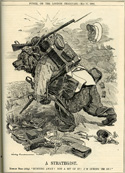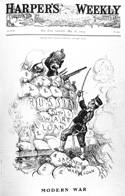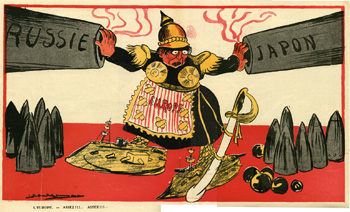
War, Part Six:
Russia and Japan, Ready for Peace
Defeated on land and sea, Russia clearly had had enough of the war but so had Japan. The Japanese generals, led by field commander Oyama, urged an early termination of the conflict for Japan's war resources of men and material were nearly exhausted. The Japanese had pushed the Russian army back nearly to the limits of Japan's own ability to supply its troops. Both countries had difficulty acquiring international loans to fund further battles. Meanwhile, Russia feared revolution by reformers at home, so the war was less important to them than it was to the Japanese for whom the conflict was a matter of national survival.
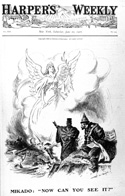
After Tsushima, the Emperor Meiji attempts to convince the Tsar that continuing the war is futile. View larger image.
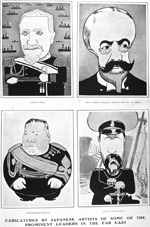
The leading men in the war, from top left, Admiral Togo, Ambassador Rosen, Field Marshall Oyama, and General Kuropatkin. Harper's Weekly. View larger image.
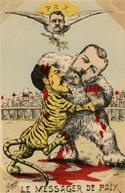
Roosevelt accepted the task of bringing the warring nations to the peace table. C. B. Doleac collection. View larger image.
Enter Roosevelt
While President Theodore Roosevelt may have advocated speaking softly and carrying a big stick in the Western hemisphere, he was anxious for peace in the Far East. In 1904, Secretary of State John Hay was so ill that the enthusiastic Roosevelt personally directed America's foreign policy, especially in the Far East. The United States' interests in the Pacific included Alaska, the Hawaiian Islands and the recently occupied Philippines, wrenched from Spanish control in 1898.

To the combatants, the diplomatic effort could not come too soon. Harper's Weekly. View larger image.
Balance of Power
Privately Roosevelt supported the Japanese in the early stages of the war, but as they followed one victory with another, the president became concerned with the future balance of power in the region. He wanted China to remain neutral and he feared that Britain, France, Germany, and Italy, each of whom was an ally of one side or the other or had other interests in Asia, would be drawn more actively into the affair.
During 1904 Roosevelt's efforts at negotiation were frustrated as Japan was determined to win back its foothold in Korea and Manchuria while Russia was convinced that it could ultimately win. By 1905 however, the belligerents became more receptive to Roosevelt and his diplomats. With its great victory at Tsushima, Japan controlled the sea, insuring that Russia could never have a complete military victory.
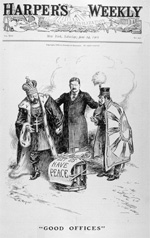
Roosevelt used his "good offices" to convince Japan and Russia to come to a peace conference. View larger image.
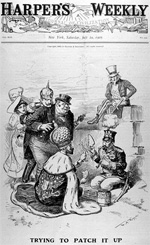
By late July 1905, European nations and the United States were hoping Russia and Japan could reach a peace agreement. View larger image.
Japan and Russia Accept Roosevelt's Initiative
On May 31, Japan secretly asked Roosevelt to use his initiative to bring the two countries together. Tsar Nicholas II, at first, vowed to fight until Russia was successful. He was finally convinced that the unpopular war was sapping Russia's finances and ruining its fragile economy and might lead to revolution and the overthrow of his government. Secretly, the Tsar agreed to accept a proposal for direct negotiations with Japan if proposed by Roosevelt. The president then formally extended his offer of mediation to end the war. The invitation was accepted by Japan on June 10 and by Russia two days later.
Sakhalin Occupied
Although the battles were over, Japan conducted one more crucial military move. In July 1905, the Japanese reoccupied Sakhalin Island, taken from them by Russia in the 1850s. This move had been urged earlier in the war by Japanese generals but was opposed by the navy. Now, on the day before the Japanese negotiators left for the peace conference, their troops landed on the island. Komura sought to use this action to full diplomatic advantage at the conference. The consequences of this last minute occupation were to have a major impact on the peace conference.
Japanese Treaty Expectations
As the countries prepared for the peace conference, there was a clear fundamental difference in their views of the war. Although Russia had lost every major battle, it remained a military power and had not surrendered to Japan. For the people of Japan, however, results of the battles indicated a great victory over a nation that had not only denied them their claims in Korea and China, but also had taken over the very land Japan had won from in 1894. Now Japan had occupied that long sought territory. Japanese citizens believed Komura's journey to Portsmouth was to be nothing less than a victory celebration, with a specific set of demands guaranteed to reflect its success in battle.
Japan had fought the war over control of Korea and Manchuria and expanded its demands to Sakhalin and Russia's payment of war expenses.

